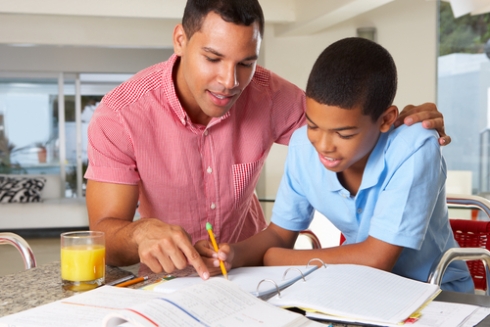A teacher’s take on how you can help your child succeed…
Click to read Handy Hints For Helping Children Learn At Home, Pt.1, Tips 1–5.
No. 6. “Know Your Child’s ‘Down time’”Here, Andrew Fuller isn’t referring to that relaxing ‘down time’ we have when we’re surrounded by candles, having a bath with a glass of vino. He’s talking of the time at which you don’t learn new information as well as you do at other times. “As a rough guide, think of the time they go to sleep, then think of the time they usually wake up, calculate the midpoint of their sleep, add twelve hours and around that time is their “down time”. For example, if your child sleeps from 9.30 pm to 7 am, the midpoint of their sleep is 2.00 am. Adding twelve hours takes us to 2.00 pm”. 2.00 pm therefore, is the time at which that child’s brain is in ‘downtime’, switching off and least likely to be primed for quality learning. This is the perfect time to engage in hands on activities, play, relaxation, crafts, sport and other activities that are less taxing on the ‘academic’ parts of the brain.
No. 7 “Eat a good breakfast”“If your Mum ever said have fish or eggs for breakfast because it’s brain food, she was right! As long as it’s medically safe to do so, a breakfast that is high in protein (think cheese, milk, bacon, eggs) and lower in carbohydrates (think cereal, orange juice and toast) promotes concentration and learning. Also encourage your child to drink lots of water- the brain runs on it! Students who don’t eat breakfast are not only more likely to gain weight; they will also have to work harder than others to do well at school.” Ew, fish for breakfast. I think parents can exercise common sense here. Obviously, Coco Pops every day for breakfast – although delish! – are not the best choice. Or worse, no breakfast at all. Give your child the right fuel!
No. 7 “Use Music”“There is a growing evidence to suggest that playing instrumental music softly in the background enhances learning.” Avoid music that’s likely to be distracting, such as pop songs that they’ll want to just sing along to, instead of knuckling in to their homework!
No. 8 “Use aromas”“Most people have had the experience of smelling a particular aroma and having a series of memories flood back. Partly this is because your olfactory nerve is directly linked to the hippocampus, which is the part of your brain where memories are integrated. The aromas most often associated with improvements in concentration and memory are lemon, basil and rosemary.”
No. 9 “Monitor their use of video and computer games”“Video games are incredibly popular and give a sense of great mastery, challenge and involvement. Boys particularly use video games in a social way. It is important to realise that the use of video and computer games is not completely passive. Too much playing of these games can be negative. These games can be so compelling they become addictive. While some games require quite intricate problem solving, the skills learned on these games do not appear to readily transfer into other arenas of life. Very few of the games require creative problem solving or an opportunity to be an active participant in determining a story line. Some exposure to computer games is good. Too much, though, can be toxic. Sadly, there is no research that tells us what the right amount of time spent of computer games should be so you’ll need to think about the balance of your child’s life and their range of activities and interests.” Treat TV similarly.
No. 10. “Help them to build the essentials skills for success”“Three of the skills needed for success at school (and in most areas of life) are concentration, memory and sequencing or getting things in the right order. The games that parents play with their children such as Snap, Uno, Concentration, Battleships, Monopoly, Chess, Jigsaw puzzles all play an incredibly important role in developing these skills of success. Computer versions of these games are not as effective in helping children develop these skills. To really help your child to succeed at school every so often switch off the TV, unplug the computer and pull out a game.”
No. 11. “Limit the amount of part-time work”“Senior secondary students should not work more than ten hours a week at a part-time job. If they do so, there is clear evidence that their marks will suffer.”
Download the summary at http://www.andrewfuller.com.au/free/AndrewFullersHandyHints.pdf, extracted from Andrew Fuller's “Help Your Child Succeed At School”.
Also read this post I reblogged, about What NOT To Do If You Want Your Child To Succeed, based on the article The Overprotected Kid.
What other Handy Hints for improving learning at home do you know of? Please share them in the comments section below!






